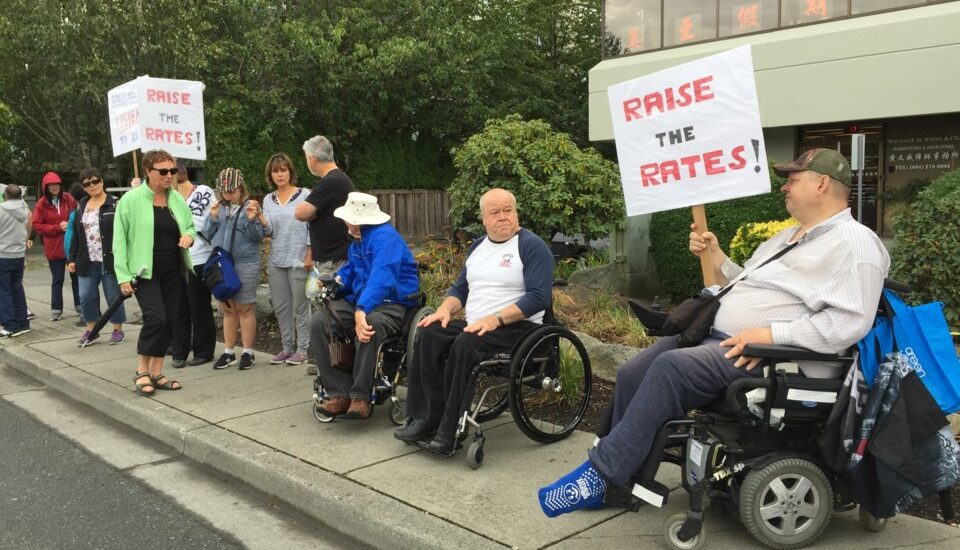
Adapted speech by sb. smith at the March 1st Virtual Vigil for the Disability Day of Mourning organized by Autistics United Canada and Vancouver-based disability community members.
Disability Day of Mourning was observed this week on March 1st. At an online vigil, I–among other speakers that day–drew attention to Bill C-7. In particular, I spoke on the ways classism has and continues to influence the success of such a bill.
Bill C-7 is currently being pushed into law in Canada, primarily due to the efforts of financially-privileged and/or newly disabled people, Dignity with Dying advocates, able-bodied lobbyists and government heads, and more.
The progressives pushing for this bill to pass into law tout the arguments of the few financially-privileged and/or newly disabled people who agree that having the so-called choice to utilize no-holds-barred MAiD is, overall, a good thing for everyone.
What these same folks don’t realize is that their class privilege clouds their perspectives on the way this legislation is and will continue to be used for harm with its money-saving potential to offload “burdens” (that is, disabled lives) from government-funded institutions like healthcare, housing, and so on.
This shameful bill is many things and, when it comes to the disabled community, it is an example of why it is increasingly necessary for financially-privileged (and especially white, financially-privileged) disabled people to confront and be forthcoming about their wealth and social status.
This is especially important given that the community is overwhelmingly comprised of us crips who (barely) survive on government benefits or are altogether ineligible for said benefits, have multiple side hustles, are under-paid, are completely unable to work, live in subsidized and/or group housing, are under-housed, are routinely rejected from medical insurance coverage, often go without medical treatments and prescriptions, are often denied medical care, and so on. Rich disabled people do not know what it means to be viewed as financial “burdens” on the institution of the Canadian nation state. They do not know what risks this position poses to our very right to be alive.
Not confronting and being forthcoming about or, perhaps, even actively hiding one’s financial privilege as a disabled person in community with other disabled people is to overwrite the unique struggles the majority of our community faces and perpetuate and incite harm among your own. It is to prove arrogance to the fact that the lives of people you are in community with are inherently more at risk. Perpetrators of this type of unchecked classism within the disabled community are, in part, responsible for the successes of things like Bill C-7.
One thing Bill C-7’s success ultimately demonstrates is that the disability community can no longer afford to ignore class privilege among our own and carry on pretending it does not matter.
Rich disableds must, at very minimum, acknowledge their wealth privilege. They must, at minimum, take cues from their disabled peers who are impacted by poverty on how to be accountable and responsible to the community. And the community as a whole needs to find ways to facilitate these conversations to help bring awareness of and accountability for class privilege to the forefront of our activism, academic work, art, community work, and so on.
If we fail to meaningfully address classism within the disability community, Bill C-7 will only be the start of what our community will face in this 21st century as histories of eugenic violence that are deeply rooted in racism, ableism, and classism will surely be repeated.
sb. smith is a fat, bisexual, mad and sick-disabled person of poor, chronically-ill Scottish and Irish descent. They were the editor of Disabled Voices Anthology (Rebel Mountain Press, 2020) and her work has been published in Arc Poetry Magazine, Maclean’s, anti-lang., Rooted in Rights, Burning Jade, Sad Girl Review, and more.
See also: Gabrielle Peters: We are entering a dangerous time to be a disabled person in Canada
Check out our new community calendar!
With a special thanks to our generous donors who make publication of the Nova Scotia Advocate possible.
Subscribe to the Nova Scotia Advocate weekly digest and never miss an article again. It’s free!



